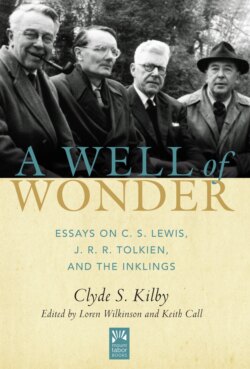Читать книгу A Well of Wonder - Clyde S. Kilby - Страница 12
На сайте Литреса книга снята с продажи.
ON SCRIPTURE, MYTH, AND THEOLOGY
ОглавлениеSummarizing four Lewis titles, Kilby discusses the Oxford professor’s rare ability to encapsulate profound and sometimes complex theological ideas in simple, figurative language. Kilby is very aware that he is introducing Lewis to an American evangelical Christian audience for whom a belief in the divine inspiration of Scripture is foundational. Thus he goes to some pains to defend Lewis’s high view of Scripture, and especially the idea that divine truth can—indeed must—be conveyed in myth, metaphor, and symbol. Thus, like much of Kilby’s writing, this essay is as much a defense of literature as it is of C. S. Lewis’s view of Scripture.
In what follows I should like to outline some of C. S. Lewis’s theological beliefs, particularly as they are expressed in Reflections on the Psalms, Miracles, Mere Christianity, and Letters to Malcolm: Chiefly on Prayer. It is not correct to say that Lewis has a “theology” if by that term is meant a systematic, all-embracing complex like that of John Calvin or Karl Barth. He repeatedly declared that he was not a theologian. Perhaps his chief aim in attempting to retain amateur status is that he may be “one person talking to another.” Yet anyone who writes a score or more of books on Christian topics inevitably will possess, in some sense, a theology. Perhaps the big difference between Lewis and the “professional” theologian is less abstraction and more particular instance and creativity. I am especially interested here in Lewis’s view of the Scripture itself as the source of theological truth.
